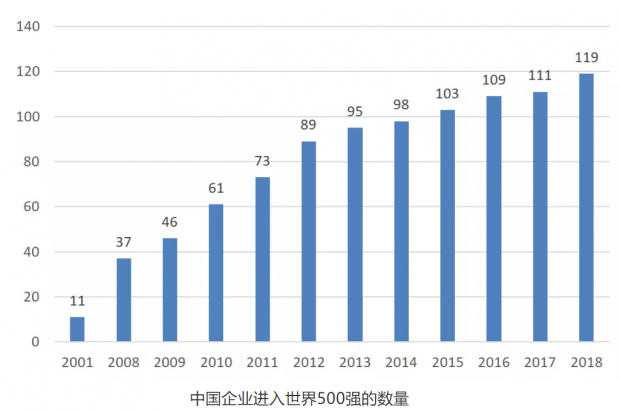阅读:0
听报道
7月25日下午,人民日报英文客户端记者王翔宇就中国企业进入《财富》世界500强现象对我进行了专访。我谈了几点意见,部分意见反映在下面的报道中,部分意见因为篇幅没有收入。
1、虽然中国这次进入世界500强的企业比较多,129家,但是其中40%是央企,民企不到18%。剔除港澳台企业之后,数量少于美国,央企比例更高。
2、进入500强榜单的央企,几乎都是位于垄断领域,包括银行、电信、石油、钢铁、保险、军工等。这说明中国的增长动能转化过程远未完成。
3、进入500强的民企有阿里、腾讯、京东、小米等新兴互联网企业,这是好事。但是,未来几年恐怕还难有更多的这类企业进入,因为这个行业是“赢者通吃”,私企垄断问题其实也很严重,只是国人的目光总是盯住国企垄断。
4、“500强”其实应该叫“500大”,因为它只看营业收入或者规模,忽视利润率、ROA和ROE等反映效率的核心指标。这种只看规模的做法,对中国这类市场大、人口多的国家有利,对小国不利;对下游企业有利,对上游企业不利。
5、要警惕中国地方政府为了入榜,人为做大地方国企的政绩冲动。这方面的教训挺多的,比如天津物产、渤海钢铁,都是濒临破产或者已经破产的500强企业。

以下是报道全文。
中国企业进入世界500强的数量
China will nurture more Global 500 companies
By Wang Xiangyu People's Daily app
02:06, July 27, 2019
Companies from China, including Hong Kong, Macao, and Taiwan, accounted for 129 of the Top 500 companies in revenue, surpassing the US for the first time ever, according to Fortune Magazine’s 2019 Global 500 list released Monday. In the feature, "It’s China’s World,” the magazine said, “That shift is transforming not just the business world but the whole world.”
According to the annual rankings, three out of the top five companies were Chinese. In 2001, when China joined the WTO, only 11 Chinese companies made the list. Ever since, the number has increased annually, overtaking Japan and major European countries alike. Last year, Fortune’s Chinese edition reported, “Not since 1995, when the Fortune Global 500 included both industrial and service companies, has the number of companies from any country grown so rapidly.”
For this year’s global tally, of the 25 new or re-listed companies, 13 were Chinese. Six of the top 10 fastest growers were from the Chinese Mainland, while another 77 advanced in rank from the previous year. Xiaomi, founded nine years ago, was the youngest newcomer on the list.
“The world’s 500 largest companies generated $32.7 trillion in revenues and $2.15 trillion in profits in 2018,” the magazine explained.
“Generally, the more companies a country has on this list, the stronger its economic strength will be. Many view China's passing of the US as the biggest highlight of this year's Global 500 list. With the improvement of China’s national strength, I think it’s an inevitable result,” said Nie Huihua from Renmin University of China’s School of Economics.
Out of the 119 Chinese Mainland companies, average sales figures topped $66.5 billion, with $35.4 billion in net assets, and profits hitting $3.5 billion. In 2018, both the average return on sales and equity were lower than the overall list average.
“We still need to calm down. This list just reflects how big the companies are but not how strong we are,” Nie said, stressing how China's advance does not mean the country has overtaken the US in terms of market competitiveness.
This year, the majority of Chinese companies represented the energy, finance, communication, transportation, steel, and real estate industries, serving as a reflection of middle and later-stage industrial development. Compared with the US and other developed nations, China occupied fewer spots among businesses from the high-tech sector.
“We need a new engine to drive economic growth. It is a good thing there are more Chinese enterprises like Huawei, Alibaba, Tencent, JD, and Xiaomi on the list,” Nie said.
The list also revealed signs of China’s transforming economy. With the inclusion of internet and technology companies, China’s global competitiveness among emerging industrial economies is more transparent than ever before.
Xiaomi was the youngest entrant, while Huawei and Microsoft were almost even. Of the seven internet companies listed, nearly all of them were from China or the US.
With the exception of two pharmaceutical enterprises, China has yet to emerge among industries related to health, medical care, and daily living. Increased ambition will emerge from entrepreneurs as China’s demand in domestic expansion continues, especially those health and living-related industries.
In the nearly two decades since China joined the WTO, domestic enterprises have proliferated in tandem with international suppliers through economic globalization and value chain development. Should Chinese companies choose not to participate in the globalization process, they will lose essential opportunities necessary to maintain the rapid development and success they’ve always enjoyed.
Today, the scope and presence of Chinese businesses has reached new heights. Some economists view this development as a new beginning. Now is the time to nurture bigger and even more powerful Global 500 companies.
话题:
0
推荐
财新博客版权声明:财新博客所发布文章及图片之版权属博主本人及/或相关权利人所有,未经博主及/或相关权利人单独授权,任何网站、平面媒体不得予以转载。财新网对相关媒体的网站信息内容转载授权并不包括财新博客的文章及图片。博客文章均为作者个人观点,不代表财新网的立场和观点。




 京公网安备 11010502034662号
京公网安备 11010502034662号 